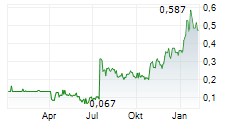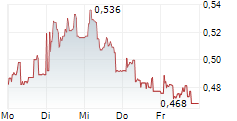LUND, SE / ACCESS Newswire / July 16, 2025 / Cantargia (STO:CANTA)
Promising efficacy data with median PFS of 7.2 months (95%CI 5.6-9.2), median OS of 13.7 months (95%CI 11.1-18.3), and 1-year survival of 54%
Strong efficacy signal observed in non-squamous NSCLC patients previously treated with the PD-1 inhibitor pembrolizumab, with median OS of 26.7 months and 91% ORR, including two complete responses
Cantargia (Cantargia AB; Nasdaq Stockholm: CANTA) today announced the publication of results from the CANFOUR trial with nadunolimab in combination with chemotherapy in the peer reviewed journal Lung Cancer. 40 patients with advanced NSCLC were treated with nadunolimab in combination with cisplatin/gemcitabine or carboplatin/pemetrexed for 4-6 cycles before continuing with nadunolimab as monotherapy or together with only gemcitabine or pemetrexed. The trial showed a manageable safety profile and encouraging median survival times, especially in patients with prior treatment with checkpoint inhibitors.
"These positive data published in Lung Cancer describe an important potential opportunity for nadunolimab, with possibilities to address a major unmet medical need" said Damian Marron, interim CEO of Cantargia. "We are particularly encouraged by the strong signal in the non-squamous NSCLC patients post PD-1 inhibitor treatment".
Lung cancer is one of the most common malignances worldwide and a leading cause of cancer-related deaths, with 84% of cases of the non-small cell lung cancer (NSCLC) type [1]. Immune checkpoint inhibitors targeting programmed death (ligand) 1 (PD-1/PD-L1) form part of the standard of care alongside chemotherapy for patients with advanced/metastatic NSCLC [2]. Treatment of NSCLC with immune checkpoint inhibitors can markedly improve tumor response rates and prolong survival, but not all patients respond to treatment and the development of treatment resistance is frequent [3, 4].
The CANFOUR Phase 2a trial with 40 advanced/metastatic NSCLC patients investigated nadunolimab in combination with cisplatin/gemcitabine (NCG) or carboplatin/pemetrexed (NCP) in first-line (1L), or in second-line (2L) after relapsing on pembrolizumab. Nadunolimab at doses of 1, 2.5 or 5 mg/kg were combined with chemotherapy for 4-6 cycles, followed by nadunolimab monotherapy or together with only gemcitabine or pemetrexed. Promising efficacy was reported with an OS of 13.7 months, which is observed to be better than historical references from randomized clinical trials of cisplatin/gemcitabine or platinum/pemetrexed in advanced NSCLC (median OS 10.3 and 11.3 months) [5,6].
Interestingly, highest efficacy was seen in patients previously treated with pembrolizumab (n=17) as compared to treatment naïve patients (n=23) (ORR 71% vs 44%; OS 15.7 vs 11.5 months). The 2L post-pembrolizumab patients had a markedly different tumor microenvironment at baseline with higher number of IL1RAP-positive immune cells, CD163+ macrophages, CD56+ NK cells and CD8+ T cells. Best response was seen in 2L non-squamous patients (n=11) which showed an outstanding ORR of 91%, PFS of 10.4 months and OS of 26.7 months, including two complete responders.
20 patients continued with nadunolimab monotherapy after having discontinued chemotherapy. One patient attained a complete response during monotherapy treatment, indicating a continued clinical effect of nadunolimab after completion of chemotherapy.
The combination showed a manageable safety profile with neutropenia being the most frequent reported adverse event.
The results support further investigation of the potential benefit in patients with non-squamous histology who previously progressed on immune checkpoint inhibitors, and to assess the potential benefit of continued nadunolimab monotherapy.
The publication, titled "Safety, efficacy, and analysis of biomarkers in patients with advanced non-small cell lung cancer treated with the anti-IL1RAP antibody nadunolimab (CAN04) in combination with platinum doublet", by Paulus et al, is available online at the Lung Cancer | Journal | ScienceDirect.com by Elsevier and will be published Cantargia's web page.
References
[1] Kratze et al. Cancer 2024 130(8) 1330-1348
[2] Owen et al JCO Oncol Pract 2024 20(7) 893-898
[3] Bagshi et al Ann Rev Path 2021 16 223-249
[4] Jenkins et al Br J Cancer 2018 118(1) 9-16
[5] Scagliotti et al J Clin Onc 2008 26(21) 3543-3551
[6] Gandhi et al N Engl J Med 2018 378(22) 2078-2092
For further information, please contact
Damian Marron, Interim CEO
Telephone: +46 (0)46-275 62 60
E-mail: damian.marron@cantargia.com
About Cantargia
Cantargia AB (publ), reg. no. 556791-6019, is a biotechnology company that develops antibody-based treatments for life-threatening diseases and has established a platform based on the protein IL1RAP, involved in a number of cancer forms and inflammatory diseases. Cantargia's oncology program, the antibody nadunolimab (CAN04), is being studied clinically, primarily in combination with chemotherapy with a focus on pancreatic cancer, non-small cell lung cancer and triple-negative breast cancer. Positive data for the combinations indicate stronger efficacy than would be expected from chemotherapy alone. Cantargia's second development program, the antibody CAN10, blocks signaling via IL1RAP in a different manner than nadunolimab and addresses treatment of serious autoimmune/inflammatory diseases, with initial focus on hidradenitis suppurativa and systemic sclerosis.
Cantargia is listed on Nasdaq Stockholm (ticker: CANTA). More information about Cantargia is available at www.cantargia.com.
About nadunolimab (CAN04)
The antibody nadunolimab binds strongly to its target IL1RAP and functions by inducing ADCC and blocking IL-1a and IL-1ß signaling. Nadunolimab can thereby counteract the IL-1 system which contributes to the immune suppressive tumor microenvironment and the development of resistance to chemotherapy. Nadunolimab is investigated in multiple clinical trials; the phase I/IIa trial CANFOUR, NCT03267316, evaluates nadunolimab in combination with standard chemotherapies in patients with pancreatic ductal adenocarcinoma (PDAC) (gemcitabine/nab-paclitaxel) or non-small cell lung cancer (NSCLC) (platinum-based chemotherapies). Positive data show durable responses for combination therapy in 73 PDAC patients, resulting in a median iPFS of 7.2 months and median OS of 13.2 months. An even higher median OS of 14.2 months was observed in a subgroup of patients with high tumor levels of IL1RAP. Strong efficacy was also observed in 40 NSCLC patients with median PFS of 7.2 months and a response rate of 55%; even higher responses were observed in non-squamous NSCLC patients. Early efficacy data from the phase 1b/2 trial TRIFOUR, NCT05181462, also shows signs of promising efficacy in TNBC with a 60% response rate for nadunolimab combined with carboplatin/gemcitabine.
Attachments
Cantargia announces publication of clinical data showing benefit of nadunolimab combination therapy in advanced lung cancer
SOURCE: Cantargia
View the original press release on ACCESS Newswire:
https://www.accessnewswire.com/newsroom/en/healthcare-and-pharmaceutical/cantargia-announces-publication-of-clinical-data-showing-benefit-of-n-1049242


